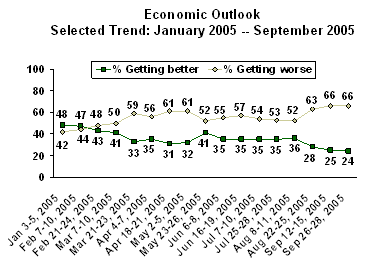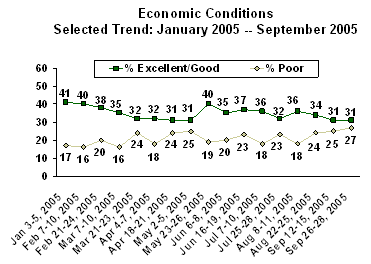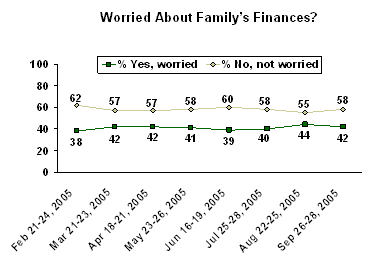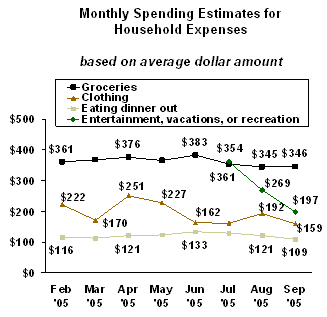GALLUP NEWS SERVICE
PRINCETON, NJ -- Americans remain negative about the direction of the U.S. economy and the majority say current economic conditions are only fair or poor. There is little evidence to suggest that these attitudes have become significantly more negative as a result of Hurricanes Katrina and Rita. Gallup's biweekly data show that the big drop in positive sentiment came in late August, before Katrina struck the Gulf Coast. In fact, Americans' concerns over rising fuel prices appear to have abated to some degree by late September. The public is less likely now than a month ago to mention energy costs as the top economic problem facing the nation, and fewer Americans say energy prices are causing them personal financial hardship than did so two weeks ago. There is no clear-cut indication in the data that Americans plan on spending less in several key categories now compared to what they reported a month ago, an important factor as the nation's retailers attempt to recover from a sluggish August.
Rating the U.S. Economy
Gallup measures the public's view of the economy on a biweekly basis, using pinpoint surveys of no more than four days' duration. This pattern of frequent, intense measurement makes it possible to more precisely assess the effects of high-profile events on consumer sentiment than do monthly consumer surveys conducted over a period of weeks.
The trend in consumer views of the U.S. economy's direction (e.g., is the economy getting worse or better?) shows that a more negative pattern of responses was established in late August, before Hurricane Katrina made landfall in Louisiana, Mississippi, and Alabama.

The two Gallup updates on this getting better/getting worse measure taken in September show only a slight deterioration in attitudes compared to late August, and no change whatsoever between the Sept. 12-15 and Sept. 26-28 measures. In short, consumer optimism about the direction of the economy has been quite stable over the last month -- albeit quite negative.
There has been less of a negative tilt in Americans' assessments of the "economic conditions in this country today" over the last several months -- either before or after Katrina.

Thirty-one percent of Americans now rate economic conditions as excellent or good, little changed from measures in late July, August, and early September. In fact, similarly negative reads on the economy were measured in March, April, and May of this year, and even more negative reads on the economy were prevalent at many points in 2003. In other words, Americans' assessments of the current economy at the moment are downbeat, but not remarkably so in the context of readings taken over the last two or three years.
What's Behind the Numbers?
Americans believe high energy costs continue to be the top economic problem facing the nation, according to Gallup's Sept. 26-28 poll. Concern about energy is followed by worries about unemployment, dealing with natural disasters, the war in Iraq, the federal budget deficit, and healthcare costs.
What is the most important economic problem facing the country today? [OPEN-ENDED]
|
Sep |
Aug |
Jul |
Jun |
May |
Apr |
|
|
% |
% |
% |
% |
% |
% |
|
|
Fuel/Oil prices |
25 |
34 |
14 |
15 |
10 |
19 |
|
Unemployment/Jobs/Wages |
14 |
15 |
19 |
19 |
18 |
18 |
|
Dealing with natural disasters |
11 |
-- |
-- |
-- |
-- |
-- |
|
War in Iraq |
11 |
10 |
11 |
9 |
11 |
8 |
|
Federal budget deficit |
6 |
5 |
5 |
6 |
4 |
5 |
|
Healthcare/Health insurance costs |
6 |
6 |
7 |
12 |
11 |
7 |
|
Outsourcing of jobs |
4 |
5 |
7 |
5 |
8 |
5 |
|
Inflation/Rising prices |
4 |
4 |
4 |
5 |
5 |
4 |
|
Lack of money |
3 |
2 |
4 |
5 |
4 |
6 |
|
Taxes |
3 |
2 |
2 |
4 |
3 |
2 |
|
Illegal immigrants |
2 |
2 |
2 |
3 |
4 |
2 |
|
Poverty/Hunger/Homelessness |
2 |
3 |
2 |
2 |
2 |
1 |
|
Poorly run government/Politics |
2 |
1 |
1 |
2 |
1 |
1 |
|
Education reform |
2 |
2 |
1 |
4 |
2 |
2 |
|
George W. Bush/His policies |
1 |
1 |
1 |
1 |
1 |
1 |
|
Gap between rich and poor |
1 |
1 |
1 |
1 |
1 |
1 |
|
Credit cards/Overspending |
1 |
1 |
2 |
2 |
2 |
1 |
|
Welfare |
1 |
1 |
1 |
1 |
1 |
1 |
|
Trade deficit |
1 |
1 |
3 |
2 |
3 |
1 |
|
Foreign aid/Focus on other countries |
1 |
* |
1 |
1 |
1 |
1 |
|
Senior care/Medicare |
1 |
1 |
1 |
1 |
1 |
1 |
|
Interest rates |
1 |
* |
1 |
* |
* |
* |
|
Economy (non-specific) |
1 |
2 |
1 |
2 |
1 |
1 |
|
Social Security |
1 |
3 |
4 |
6 |
6 |
7 |
|
Security/Threat of terrorism |
* |
2 |
3 |
1 |
-- |
-- |
|
Companies closing/No growth |
* |
1 |
2 |
1 |
-- |
-- |
|
International relations |
* |
1 |
* |
* |
* |
* |
|
College tuition expenses |
* |
* |
1 |
* |
* |
* |
|
Retirement |
-- |
* |
1 |
1 |
1 |
1 |
|
Stock market |
-- |
-- |
* |
* |
* |
* |
|
Other |
5 |
5 |
6 |
9 |
7 |
4 |
|
None |
* |
1 |
1 |
1 |
2 |
1 |
|
No opinion |
7 |
6 |
8 |
9 |
9 |
8 |
|
* Less than 0.5% |
||||||
|
Percentages add to more than 100% due to multiple responses. |
||||||
There have been some changes in these perceptions over the last several months:
- Energy costs zoomed up in importance as the top economic problem facing the nation in August, but have come back down slightly. In other words, despite the increasing cost of gasoline in the immediate aftermath of Katrina in early September, the public is less likely now than a month ago to say high fuel costs are the most important economic problem facing the nation.
- Eleven percent say dealing with natural disasters is the top economic problem, the first time this issue has appeared as a category in response to this question.
- Mentions of the cost of the Iraq war have stayed relatively stable and prevalent over the past year.
Gallup asks Americans in a slightly different fashion to talk about the most important financial problem facing their families today.
What is the most important financial problem facing your family today? [OPEN-ENDED]
|
Sep |
Aug |
Jul |
Jun |
May |
Apr |
|
|
% |
% |
% |
% |
% |
% |
|
|
Energy costs/Oil and gas prices |
17 |
20 |
8 |
7 |
5 |
11 |
|
Healthcare costs |
11 |
10 |
13 |
17 |
18 |
14 |
|
Lack of money/Low wages |
10 |
11 |
11 |
12 |
12 |
15 |
|
Too much debt/Not enough money to pay debts |
8 |
6 |
7 |
6 |
8 |
8 |
|
High cost of living/Inflation |
7 |
6 |
6 |
8 |
5 |
5 |
|
College expenses |
7 |
6 |
7 |
7 |
8 |
7 |
|
Unemployment/Loss of job |
6 |
7 |
8 |
7 |
8 |
7 |
|
Cost of owning/renting a home |
5 |
3 |
4 |
6 |
6 |
4 |
|
Taxes |
4 |
3 |
4 |
3 |
3 |
3 |
|
Retirement savings |
3 |
5 |
6 |
6 |
9 |
8 |
|
Interest rates |
1 |
1 |
1 |
1 |
1 |
1 |
|
Lack of savings |
1 |
1 |
1 |
2 |
-- |
-- |
|
Social Security |
1 |
2 |
1 |
2 |
2 |
1 |
|
Transportation/Commuting costs |
1 |
1 |
1 |
2 |
-- |
-- |
|
State of the economy |
1 |
* |
1 |
1 |
-- |
-- |
|
Stock market/Investments |
* |
1 |
1 |
1 |
-- |
-- |
|
Controlling spending |
* |
1 |
1 |
1 |
-- |
-- |
|
Other |
4 |
4 |
4 |
6 |
4 |
5 |
|
None |
18 |
16 |
17 |
16 |
16 |
15 |
|
No opinion |
4 |
5 |
5 |
3 |
4 |
5 |
|
* Less than 0.5% |
||||||
|
Percentages add to more than 100% due to multiple responses. |
||||||
The cost of energy tops the list, as it did in late August, followed by concerns over healthcare costs, lack of money, too much debt, the high cost of living, college expenses, and unemployment. As was the case in terms of discussion of economic problems facing the nation as a whole, concerns about energy costs are less likely to be mentioned now than they were in August.
Family Worries
Gallup doesn't find much change in Americans' self-reported worries about their families' finances.

Four out of 10 Americans worry about their finances, but this number is statistically unchanged across the eight times this question has been asked since February of this year.
In other words, despite the downturn in consumer views of the U.S. economy, there has been little change in consumers' views of their own family financial situations -- at least as measured by this "worry" question.
Spending?
Gallup has asked Americans for a number of months to estimate how much they are planning on spending "this month" across four categories: groceries, clothing, eating dinner at a restaurant, and entertainment, vacation travel, or recreational activities.
The trend lines for the average estimates across these categories are represented in the accompanying graph.

The last two months have shown a slight downtick in estimated average spending on groceries compared to previous months this year.
Average self-reported spending on clothing has varied since February, reaching its highest points in April and May, and its lowest points in June, July, and the current September reading.
The current reading on intended amount to be spent on eating out over the next month -- $109 -- is technically the lowest recorded since February, but statistically, it is not significantly different from other readings earlier this year.
There has been a significant drop-off in self-reported spending on entertainment/vacation travel/recreational activities this month compared to July and August. This is reasonably likely to be a result of the end of the summer vacation season and therefore not necessarily an indication of an abnormal reduction in retail spending in this category.
Survey Methods
These results are based on telephone interviews with a randomly selected national sample of 1,007 adults, aged 18 and older, conducted Sept. 26-28, 2005. For results based on this sample, one can say with 95% confidence that the maximum error attributable to sampling and other random effects is ±3 percentage points. In addition to sampling error, question wording and practical difficulties in conducting surveys can introduce error or bias into the findings of public opinion polls.
